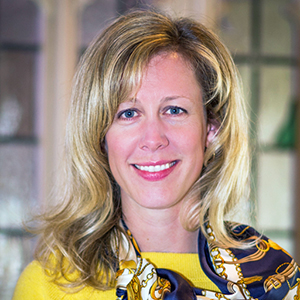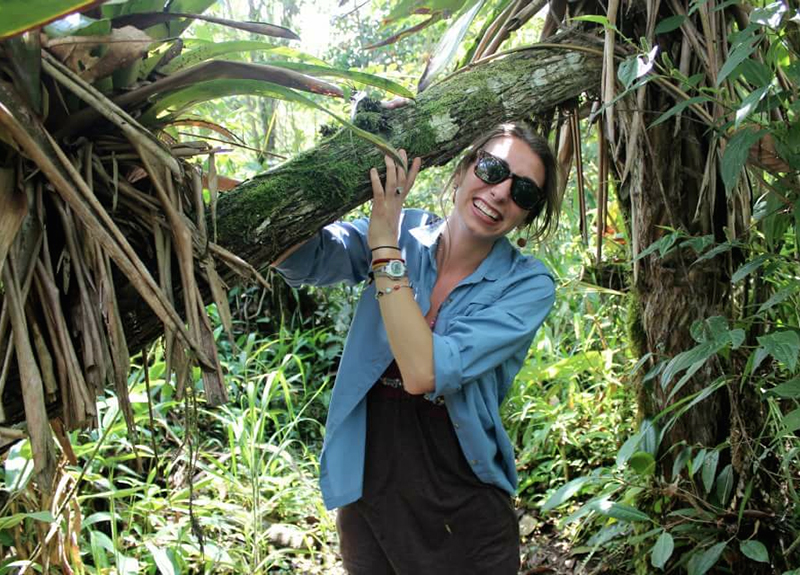Graduate and undergraduates leaving Northwestern this year have set their sights on contributing to the discovery and advancement of solutions for some of the world’s most pressing energy and sustainability issues. Their ambitions extend from natural resources to technology, which they are addressing through work and ongoing study. Read on to learn about their plans.
Kyle Aldrich (McC ’18)
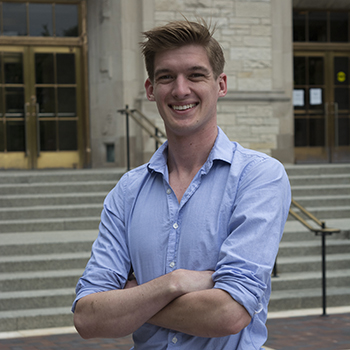
Kyle Aldrich graduated with a degree in mechanical engineering from Northwestern's McCormick School of Engineering.
What are your plans after graduation?
I am a process engineer for Gas Cleaning Technologies, a consulting firm that specializes in pollution control systems for metallurgical plants. I will be based in Chicago and traveling to visit plants around the world.
How do you pursue energy and/or sustainability in your work?
My company's work is focused on minimizing emissions, energy use, and water use for metallurgical plants around the world. Using a combination of engineering fundamentals and empirical data, we develop models to identify and correct inefficiencies in a system. I take fluid data collected during visits to the plants and build models to match the current conditions. Using this baseline, the model can be adjusted to predict performance and the outputs of these models are used to improve particulate capture and reduce consumption.
What did you learn at Northwestern that you will carry with you throughout your future?
Northwestern taught me that the most important part of engineering is the ability to continue learning about new tools and concepts, then applying those to current and future projects. I knew almost nothing about cars when I joined the Northwestern Formula Racing team and had to learn as I worked on a project. This experience has paralleled my professional work, with every project requiring me to research new systems and understand how they work to make sure the original model is accurate and the adjustments are feasible.
William Bach (McC '18)
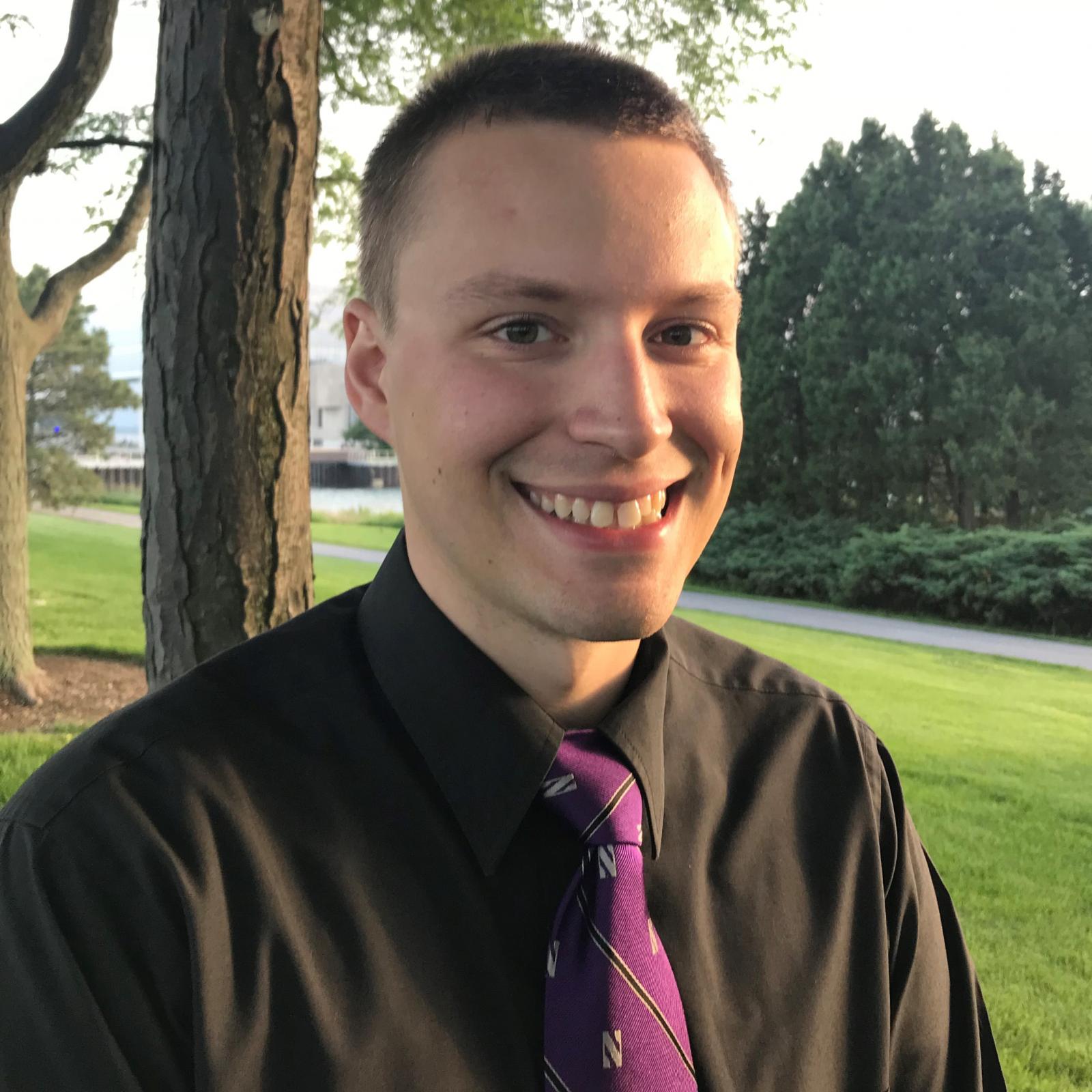 William Bach is graduating with a degree in civil engineering from Northwestern's McCormick School of Engineering. He also has earned certificates in architectural engineering and design as well as in sustainability and energy.
William Bach is graduating with a degree in civil engineering from Northwestern's McCormick School of Engineering. He also has earned certificates in architectural engineering and design as well as in sustainability and energy.
What are your plans after graduation?
After graduation, I will be joining Edison Energy as a Project Engineer in Chicago. My role will involve performing energy audits, commissioning and retro-commissioning, identifying and implementing capital and operational energy conservation projects, and measurement and verification of energy saving measures.
How do you pursue energy and/or sustainability in your work?
Edison Energy’s work focuses on reducing energy use for its clients through more efficient operation and design of energy-consuming systems. I am excited to be able to work on energy efficiency projects in my position, producing tangible and impactful energy savings. I am proud to know that my work will not only benefit clients by reducing energy usage and costs, but also society as a whole by improving the efficiency and reducing the carbon footprint of necessary infrastructure in the built environment.
What did you learn at Northwestern that you will carry with you throughout your future?
I was lucky enough to participate in and lead the Northwestern University 2017 Solar Decathlon Team, House by Northwestern, as the Project Manager. That experience combined high-performance building design with industry professionals and hands-on construction experience with experienced contractors as the student team designed, built, shipped, and competed against other school teams in a 1,000 SF net-zero solar powered home.
I learned a massive amount about the architecture, engineering and construction industries in a shorter period than I ever could have imagined, and the experience has given me an unbelievable jump-start in the industry. This project forced me to apply my engineering knowledge to a myriad of real-world problems; teaching me that while only a small portion of problems in the world are ever explicitly covered in coursework, a large portion of those same problems can be solved with a creative application of the engineering fundamentals Northwestern stresses so strongly.
Kyle Bushick (McC ’18)
Kyle Bushick is graduating with a degree in materials science and engineering from Northwestern's McCormick School of Engineering.
What are your plans after graduation?
Following graduation I will be pursuing a PhD in materials science and engineering from the University of Michigan. There, I will focus on using computational tools to better understand and predict the behavior and properties of materials used for energy applications.
How will you pursue energy and/or sustainability in your future work?
I will primarily be focusing on energy and sustainability by the materials I research, which can broadly be categorized as functional electronic/optoelectronic materials—common examples would be LEDs and solar cells. By improving current materials or finding superior materials, we will ultimately be able to make devices that use less energy, generate energy more efficiently, or add completely novel functionality such as tuning the reflectivity of windows to manage heat!
What did you learn at Northwestern that you will carry with you throughout your future?
One of the major takeaways from my time at Northwestern is a better understanding of the interconnectedness of the world. Global warming, for example, is not a problem that can be solved with the invention of a new technology but instead requires significant cooperation across fields and disciplines. I've also come to appreciate the benefits of teamwork and collaboration—something that was strengthened through classes and projects, as well as through internships with QuesTek Innovations and SpaceX. I've found that collaboration is critical to progress and success and is underpinned by the need for clear communication to varied audiences, from diverse teams of collaborators to the general public.
Emilie Jones (McC ‘18)
 Emilie Jones is graduating from Northwestern's McCormick School of Engineering with a degree in mechanical engineering. She also has an engineering focus in environmental design from classes at the Institute for Sustainability and Energy at Northwestern (ISEN) and the Segal Design Center.
Emilie Jones is graduating from Northwestern's McCormick School of Engineering with a degree in mechanical engineering. She also has an engineering focus in environmental design from classes at the Institute for Sustainability and Energy at Northwestern (ISEN) and the Segal Design Center.
What are your plans after graduation?
After graduation I will be pursuing a masters in sustainability science at the University of Tokyo in their Graduate Program for Sustainability Science - Global Leadership Initiative. I plan to research the intersection between sustainable technology development and sustainable policy development and implementation. Specifically, I will be examining policy development and implementation of sustainable technologies that produced unexpected, primarily negative, environmental impacts. From a large scale, international level, I plan to examine which countries are most likely to successfully develop and implement sustainable policy without negative unintended consequences and what factors allowed them to be so successful.
How will you pursue energy and/or sustainability in your future work?
Even if a technology that would revolutionize our way of interacting with the environment is developed, it will not matter if it is not implemented—and implemented on a large enough scale to have an impact. From my research at the University of Tokyo, I hope to be able to devise a list of recommendations for sustainable policy makers in order to ensure the policy that does manage to be passed and implemented has the greatest possibility of success. I am pursuing a masters in sustainability to further deepen my understanding of the complex nature of sustainability challenges facing our world today. That knowledge will fuel and guide me in my future work.
What did you learn at Northwestern that you will carry with you throughout your future?
Coming from a technology intensive background in mechanical engineering at Northwestern, I not only know of groundbreaking new innovations in sustainable technology, but I am also able to understand how they operate and can be optimally implemented. This, coupled with the whole-brain engineering mindset and approach to problem solving, will allow me to approach the challenges faced in trying to create a world-wide culture of sustainability in a unique and fresh manner so as to derive new and better solutions.
Alexander Martin (BSM & McC ’18)
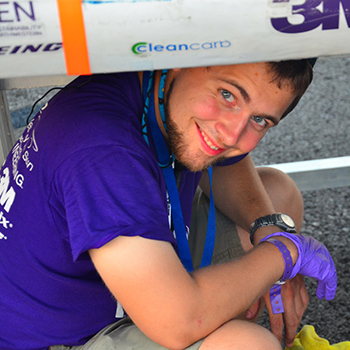 Alexander Martin is graduating from Northwestern's McCormick School of Engineering with a degree in mechanical engineering and a degree in violin performance from the Bienen School of Music.
Alexander Martin is graduating from Northwestern's McCormick School of Engineering with a degree in mechanical engineering and a degree in violin performance from the Bienen School of Music.
What are your plans after graduation?
I will be joining the Avionics Integration Engineering team at SpaceX Headquarters in Hawthorne, CA. As part of this team I will be helping to coordinate and problem-solve between design, test, and manufacturing. I hope to continue in this or a similar job for a few years while I figure out what I want to pursue in grad school.
How will you pursue energy and/or sustainability in your future work?
My dream job would be to work as a designer or systems engineer on a renewable energy project of some kind. I hope that my work in aerospace will give me the technical background necessary to do this kind of work. I am also presently considering pursuing graduate studies in sustainability or sustainability policy, so that I am better able to make business and design decisions that reflect a sustainable mindset.
What did you learn at Northwestern that you will carry with you throughout your future?
From a skills-oriented perspective, I learned how to work on a team and how to effectively present clear and concise information in written or graphical form. My growth in these areas was especially aided by work I did as part of the Northwestern Solar Car Team, working to design, build, and test a sustainable, fully-electric, solar-powered vehicle; as well as my ME Senior Capstone project.
From a life-wisdom-oriented perspective, I learned how to foster strong friendships with others, how to value both logical analysis and artistic creativity, and how to value time for rest and relaxation.
Jo Machesky (McC & WCAS ’18)
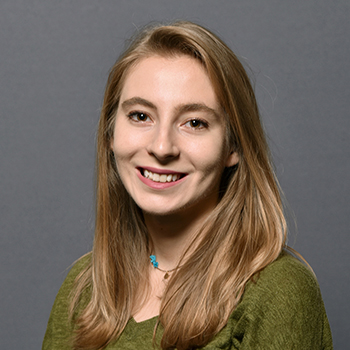 Jo Machesky is graduating with a degree in environmental engineering from Northwestern's McCormick School of Engineering and a degree in integrated science from the Judd A. and Marjorie Weinberg College of Arts and Sciences.
Jo Machesky is graduating with a degree in environmental engineering from Northwestern's McCormick School of Engineering and a degree in integrated science from the Judd A. and Marjorie Weinberg College of Arts and Sciences.
What are your plans after graduation?
I will be continuing my studies at Yale with a goal of obtaining a PhD in environmental engineering. My research will focus on air pollution potentially under Drew Gentner, a Northwestern chemical and environmental engineering graduate.
How will you pursue energy and/or sustainability in your future work?
Air quality is one of the leading causes of death worldwide. In order to build a sustainable future composed of adaptable and resilient communities, excellent air quality can improve the quality of life for residents and minimize the environmental impacts the communities are having on the organisms around them. When considering air quality in urban areas, a large source of pollution comes from vehicle exhaust. However cleaner transportation technologies exist which would drastically reduce the environmental and health impacts associated with traditional engines. This thinking can also extended to how we produce energy in mass quantities. Choosing more sustainable options, such as renewables, can allow for an improvement in air quality. Researching the current air quality allows us to learn about how much air pollution is acceptable and how air pollution spreads over large areas—questions that will continue to grow in importance as the world continues to globalize.
What did you learn at Northwestern that you will carry with you throughout your future?
I learned how not only how to apply whole-brain engineering thinking to environmental problems, but also to consider the social impacts of environmental engineering. In my classes, we were taught to approach a problem while considering the health and environmental impacts of any solution we proposed because environmental engineering is ultimately driven by the need to protect the public and our environment.
Andrea Ostenso (MS McC ’18)
 Andrea is graduating from Northwestern's McCormick School of Engineering with a master’s in environmental engineering.
Andrea is graduating from Northwestern's McCormick School of Engineering with a master’s in environmental engineering.
What are your plans after graduation?
I have a position with Global Green in Santa Monica, CA working on their Green Urbanism Program. Global Green’s mission is to foster a global value shift toward a sustainable and secure future to help people, places, and the planet. I am excited to be a part of a company whose values align with mine.
How will you pursue energy and/or sustainability in your future work?
Cities have the potential to be incredibly efficient, vibrant places to sustain the growing population. My passions lie in the interaction between humans and their built environment, and how this interaction can be sustainable. I love thinking about the intricacies and implementation of sustainable living. However, I know not everyone is passionate about this, so my goal is to re-design city living so all people will live in a way that respects the environment by default.
What did you learn at Northwestern that you will carry with you throughout your future?
At Northwestern I had the amazing opportunity to work on multiple design teams that focused on the development of sustainable cities. One of my favorite projects was collaborating with Center for Neighborhood Technology to re-design Chicago’s Central Manufacturing District into a 21st century eco-district. My experience at Northwestern through academic work, independent research, participation in clubs, and study abroad opportunities allowed me to create an integrated approach to developing solutions to environmental issues.





